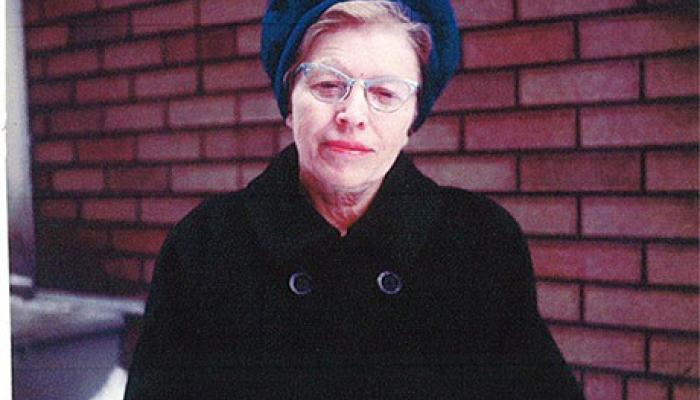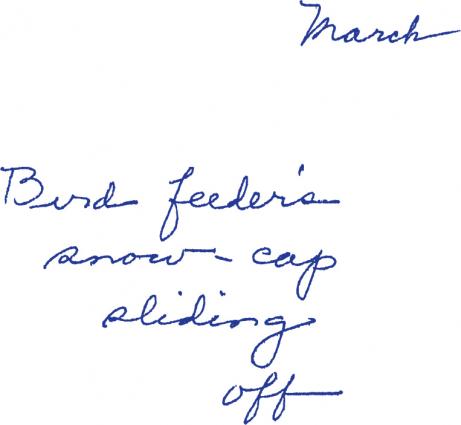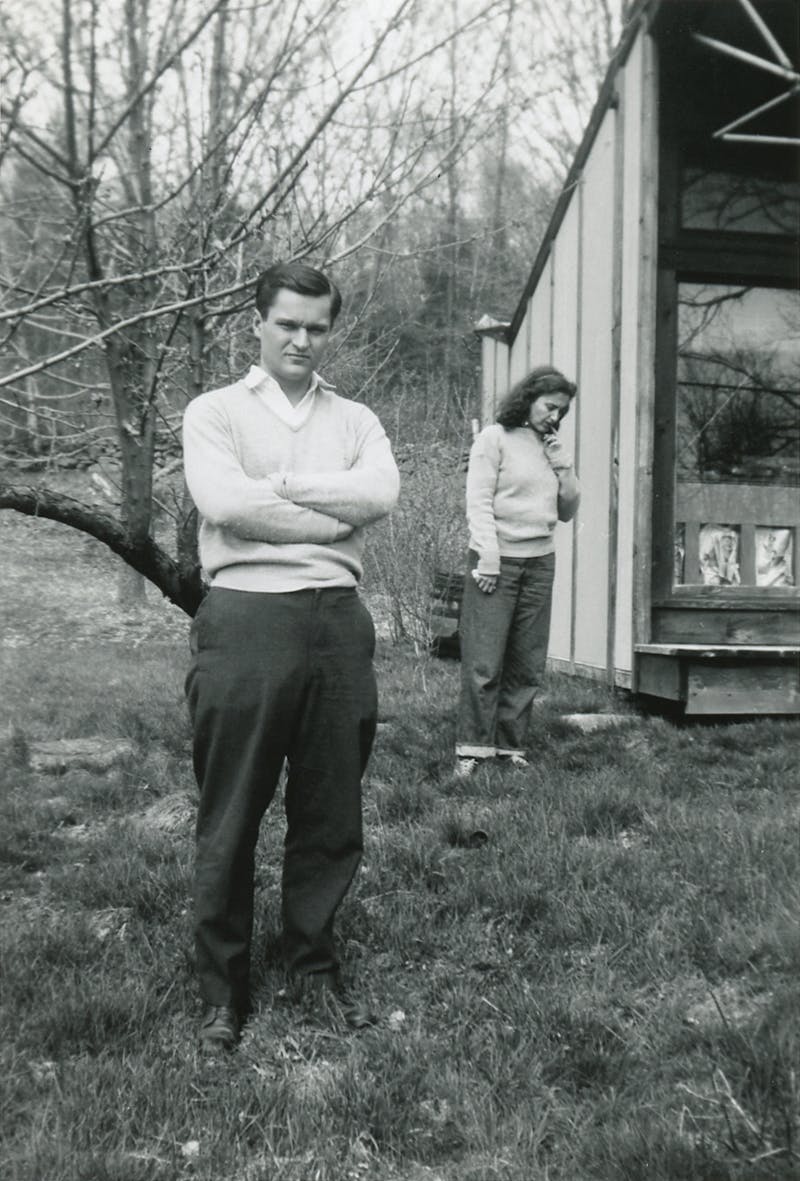
.
There's a better shine
on the pendulum
than is on my hair
and many times
. . . .
I've seen it there.

.
There's a better shine
on the pendulum
than is on my hair
and many times
. . . .
I've seen it there.

In October of 1964, having no other book prospects on the near horizon, Lorine Neidecker took action and assembled her own—a book of thirty poems written into the pages of a dime-store sketch pad, whose front and back she covered in wrapping paper. She carefully handwrote the small poems in blue-inked cursive, placing each one on its own unnumbered sheet of paper. She then sent the book, with the wry title Homemade Poems inscribed on the cover, to her friend, the poet and editor Cid Corman, who was living in Japan at the time. This Lost & Found chapbook presents a simple facsimile edition of Homemade Poems that is congruent to the original book in all fundamental ways. Thus readers now have a chance to read Niedecker’s handwriting and move through and around the book according to the same chief physical features, spaces, and tempos she originally built into it. The chapbook also includes an afterword, “Usable Dimensions,” which is included as a pamphlet insert.

PHOTOGRAPH BY JENNY PENBERTHY
[Mr. Van Ess bought 14 washcloths?]
Veritas sequitur ...
In the small beauty of the forest
The wild deer bedding down-
That they are there!
Their eyes
Effortless, the soft lips
Nuzzle and the alien small teeth
Tear at the grass
The roots of it
Dangle from their mouths
Scattering earth in the strange woods.
They who are there.
Their paths
Nibbled thru the fields, the leaves that shade them
Hang in the distances
Of sun
The small nouns
Crying faith
In this in which the wild deer
Startle, and stare out.
“Write poetry as if you were in love. If you are always in love you will not always write the same poem, but if you are never in love you may.” ~ Kenneth Koch
“And, with a shout, collecting coat-hangers
Dour rebus, conch, hip
Ham, the autumn day, oh how genuine!
Literary frog, catch-all boxer, O
Real! The magistrate, say “group,' bower, undies
Disk, poop, “Timon of Athens.” When
The bugle shimmies, how glove towns!
It's merrimac, bends, and pure gymnasium
Impy keels! The earth desks, madmen
Impose a shy (oops) broken tube's child---
Land! Why are your bandleaders troops
Or is? Honk, can the mailed rose
Gesticulate? Arm the paper arm!
Bind up the chow in its lintel of sniff.
Rush the pilgrims, destroy tobacco, pool
The dirty beautiful jingling pyjamas, at
Last beside the stove-drum-preventing oyster,
The “Caesar” of tower dins, the cold's “I'm
A dear.” O bed, at which I used to sneer at.
Bringing cloth. O song, “Dusted hoops!” He gave
A dish of. The bear, that sound of pins. O French
Ice-cream! balconies of deserted snuff! The hills are
very underwear, and near “to be”
An angel is shouting, “Wilder baskets!”
Kenneth Koch
1st stanza of When the Sun Tries to Go On


The first of the undecoded messages read: "Popeye sits
in thunder,
Unthought of. From that shoebox of an apartment,
From livid curtain's hue, a tangram emerges: a country."
Meanwhile the Sea Hag was relaxing on a green couch: "How
pleasant
To spend one's vacation en la casa de Popeye," she
scratched
Her cleft chin's solitary hair. She remembered spinach
And was going to ask Wimpy if he had bought any spinach.
"M'love," he intercepted, "the plains are decked out
in thunder
Today, and it shall be as you wish." He scratched
The part of his head under his hat. The apartment
Seemed to grow smaller. "But what if no pleasant
Inspiration plunge us now to the stars? For this is my
country."
Suddenly they remembered how it was cheaper in the country.
Wimpy was thoughtfully cutting open a number 2 can of spinach
When the door opened and Swee'pea crept in. "How pleasant!"
But Swee'pea looked morose. A note was pinned to his bib.
"Thunder
And tears are unavailing," it read. "Henceforth shall
Popeye's apartment
Be but remembered space, toxic or salubrious, whole or
scratched."
Olive came hurtling through the window; its geraniums scratched
Her long thigh. "I have news!" she gasped. "Popeye, forced as
you know to flee the country
One musty gusty evening, by the schemes of his wizened,
duplicate father, jealous of the apartment
And all that it contains, myself and spinach
In particular, heaves bolts of loving thunder
At his own astonished becoming, rupturing the pleasant
Arpeggio of our years. No more shall pleasant
Rays of the sun refresh your sense of growing old, nor the
scratched
Tree-trunks and mossy foliage, only immaculate darkness and
thunder."
She grabbed Swee'pea. "I'm taking the brat to the country."
"But you can't do that--he hasn't even finished his spinach,"
Urged the Sea Hag, looking fearfully around at the apartment.
But Olive was already out of earshot. Now the apartment
Succumbed to a strange new hush. "Actually it's quite pleasant
Here," thought the Sea Hag. "If this is all we need fear from
spinach
Then I don't mind so much. Perhaps we could invite Alice the Goon
over"--she scratched
One dug pensively--"but Wimpy is such a country
Bumpkin, always burping like that." Minute at first, the thunder
Soon filled the apartment. It was domestic thunder,
The color of spinach. Popeye chuckled and scratched
His balls: it sure was pleasant to spend a day in the country.
As Robert D. Lundy explains in "The Polk Street Background of McTeague" (Norton Critical Edition pp. 257-262), Norris used many observed details of actual San Francisco places in the novel. One was the spectacular Cliff House to which McTeague and Marcus walk in Chapter 4. The third version of the Cliff House, pictured to the right, was built in 1896 and burned down in 1907. |  | |

The Octopus (excerpt)
Dyke reached the Post Office in Bonneville toward eleven o'clock, but he did not at once go to Ruggles's office. It was seldom he got into town, and when he did he permitted himself the luxury of enjoying his evident popularity. He met friends everywhere, in the Post Office, in the drug store, in the barber shop and around the court-house.
At the drug store, his eye was caught by a "transparent slate," a child's toy. "Now, there's an idea, Jim," he observed to the boy behind the soda-water fountain; "I know a little tad that would just about jump out of her skin for that. Think I'll have to take it with me. Smartest little tad in all Tulare County, and more fun! A regular whole show in herself."
"And the hops?" inquired the other.
"Great!" declared Dyke, with the good-natured man's readiness to talk of his private affairs to anyone who would listen. "Perfect. I'm dead sure of a bonanza crop by now. The rain came just right. I actually don't know as I can store the crop in those barns I built, it's going to be so big. That foreman of mine was a daisy. Jim, I'm going to make money in that deal. You know the crop is contracted for already. Sure, the foreman managed that. He's a daisy. Chap in San Francisco will take it all and at the advanced price. I wanted to hang on, to see if it wouldn't go to six cents, but the foreman said, 'No, that's good enough.' So I signed. Ain't it just great?"
"I suppose you'll stay right by hops now?"
"Right you are. I know a good thing when I see it. There's plenty others going into hops next season. I set 'em the example. Wouldn't be surprised if it came to be a regular industry hereabouts. I'm planning ahead for next year already. I can let the foreman go, now that I've learned the game myself, and I think I'll buy a piece of land off Quien Sabe and get a bigger crop, and build a couple more barns, and, by George, in about five years’ time I'll have things humming. I'm going to make money, Jim."
At Ruggles's office, which was the freight as well as the land office of the P. and S. W. Railroad, Dyke was surprised to see a familiar figure in conference with Ruggles himself, by a desk inside the railing.
The figure was that of a middle-aged man, fat, with a great stomach, which he stroked from time to time. As he turned about, addressing a remark to the clerk, Dyke recognized S. Behrman, banker, railroad agent, and political manipulator.
"I'll be wanting some cars of you people before the summer is out," observed Dyke to the clerk as he folded up and put away the order that the other had handed him. He remembered perfectly well that he had arranged the matter of transporting his crop some months before, but he liked to busy himself again and again with the details of his undertaking.
(Continued)
1
Santa Fe Trail I go separately The sweet knees of oxen have pressed a path for me ghosts with ingots have burned their bare hands it is th...
